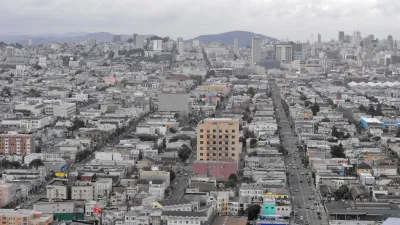A group that coined the term, "stack and pack" to deride density and its role in reducing carbon emissions lost in court when the judge rejected their argument that only technological improvements in cars and fuels were necessary to reduce emissions.

The lawsuit was one of four challenging Plan Bay Area, the regional plan approved by the Association of Bay Area Counties (ABAG) and the Metropolitan Transportation Commission (MTC) last July to meet the requirements of the landmark climate change law of 2008, SB 375, that aims to reduce carbon emissions through improved land use and transportation investments.
"Bay Area Citizens, represented by the conservative Pacific Legal Foundation (PLF), filed the suit in August [posted here.] The group argued the plan was unneeded because California laws reducing the carbon content of fuels and requiring cars and trucks to get better gas mileage would lower greenhouse gas emissions," writes Bob Egelko of the San Francisco Chronicle.
But Alameda County Superior Court Judge Evelio Grillo said Wednesday (July 2) that a 2007 [sic] state law required the agencies to develop a plan that would meet greenhouse gas-reduction targets on its own, without considering the impact of the fuel laws.
In a PLF Liberty Blog, the attorney who argued the case, Jonathan Wood, wrote, "The Citizens oppose the Plan because it’s unnecessary to achieve the environmental goals of S.B. 375 and will likely end up forcing people to live in dense “stack and pack” housing, denying them the American dream of the single family home."
Grillo agreed with the arguments made by ABAG and MTC "that failing to adopt a regional housing and transit plan, as Bay Area Citizens proposed, 'would result in less residential and employment density, which would result in less transit ridership, greater vehicle delay generally, and greater congested vehicle miles per capita.'"
As a result, he said, the agencies found they would be unable to meet emissions-reduction goals set by the state Air Resources Board.
As we previously noted, environmentalists settled their Plan Bay Area lawsuit in June; the Building Industry Association of the Bay Area dropped its lawsuit in March, leaving only Post Sustainability Institute's lawsuit challenging Plan Bay Area, plus the appeal that Bay Area Citizens will file, according to Wood.
FULL STORY: Judge rejects challenge to Bay Area land-use, transit plan

National Parks Layoffs Will Cause Communities to Lose Billions
Thousands of essential park workers were laid off this week, just before the busy spring break season.

Retro-silient?: America’s First “Eco-burb,” The Woodlands Turns 50
A master-planned community north of Houston offers lessons on green infrastructure and resilient design, but falls short of its founder’s lofty affordability and walkability goals.

Delivering for America Plan Will Downgrade Mail Service in at Least 49.5 Percent of Zip Codes
Republican and Democrat lawmakers criticize the plan for its disproportionate negative impact on rural communities.

Test News Post 1
This is a summary

Test News Headline 46
Test for the image on the front page.

Balancing Bombs and Butterflies: How the National Guard Protects a Rare Species
The National Guard at Fort Indiantown Gap uses GIS technology and land management strategies to balance military training with conservation efforts, ensuring the survival of the rare eastern regal fritillary butterfly.
Urban Design for Planners 1: Software Tools
This six-course series explores essential urban design concepts using open source software and equips planners with the tools they need to participate fully in the urban design process.
Planning for Universal Design
Learn the tools for implementing Universal Design in planning regulations.
EMC Planning Group, Inc.
Planetizen
Planetizen
Mpact (formerly Rail~Volution)
Great Falls Development Authority, Inc.
HUDs Office of Policy Development and Research
NYU Wagner Graduate School of Public Service


























